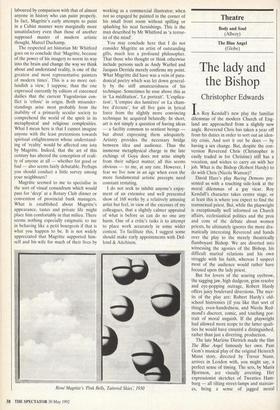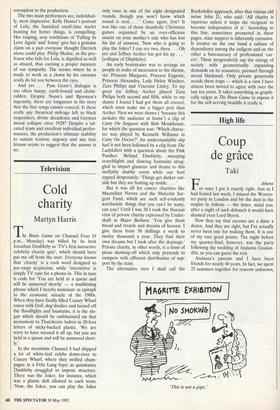Theatre
Body and Soul (Albery) The Blue Angel (Globe)
The lady and the Bishop
Christopher Edwards
In Roy Kendall's new play the familiar dilemmas of the modern Church of Eng- land are approached from a slightly new angle. Reverend Chris has taken a year off from his duties in order to sort out an iden- tity crisis. And sort it out he does — by having a sex change. But, despite the con- version Reverend Chris (Christopher is easily traded in for Christine) still has a vocation, and wishes to carry on with her job. What is the Bishop (Robert Hardy) to do with Chris (Nicola Watson)?
David Hare's play Racing Demons pre- sented us with a touching side-look at the moral dilemmas of a gay vicar. Roy Kendall's character takes centre stage, or at least this is where you expect to find the transsexual priest. But, while the playwright is exceptionally well informed on Church affairs, ecclesiastical politics and the pros and cons of the debate about women priests, he ultimately ignores the more dra- matically interesting Reverend and hands over the play to the merely theatrically flamboyant Bishop. We are diverted into witnessing the agonies of the Bishop, his difficult marital relations and his own struggle with his faith, whereas I suspect most of the audience would rather have focused upon the lady priest.
But for lovers of the soaring eyebrow, the sagging jaw, high dudgeon, grim resolve and eye-popping outrage, Robert Hardy offers juicy boulevard diversions. The mer- its of the play are: Robert Hardy's old- school histrionics (if you like that sort of thing), even-handedness, and Nicola Red- mond's discreet, comic, and touching por- trait of moral anguish. If the playwright had allowed more scope to the latter quali- ties he would have ensured a distinguished, rather than just a diverting, production.
The late Marlene Dietrich made the film The Blue Angel famously her own. Pam Gem's musical play of the original Heinrich Mann story, directed by Trevor Nunn, arrives in London with, you might say, a perfect sense of timing. The sets, by Maria Bjornson, are visually arresting. Her expressionist sketches of Twenties Ham- burg — all tilting street-lamps and staircas- es, bring a sense of jagged moral
corruption to the production.
The two main performers are, individual- ly, most impressive. Kelly Hunter's portrait of Lola, the famished small-time starlet hunting for better things, is compelling. Her rasping, sexy renditions of `Falling In Love Again' and `Donny' give her a genuine claim on a part everyone thought Dietrich alone could play. Philip Madoc, as the pro- fessor who falls for Lola, is dignified as well as absurd, thus earning a proper measure of our sympathy. The scenes where he is made to work as a clown by his enemies really do hit you between the eyes.
And yet. . . . Pam Gems's dialogue is too often lumpy, earth-bound and cliché- ridden. Despite Nunn's and Bjornson's ingenuity, there are longueurs in the story that the fine songs cannot conceal. Is there really any theatrical mileage left in black suspenders, divine decadence and German moral collapse circa 1928? Despite a tal- ented team and excellent individual perfor- mances, the production's ultimate inability to sustain tension, urgency and any true frisson seems to suggest that the answer is no.

















































 Previous page
Previous page